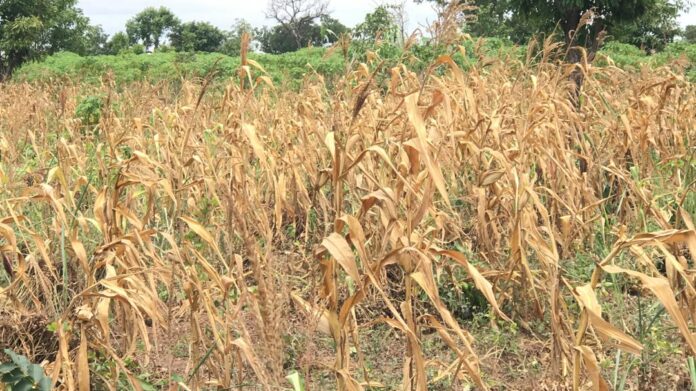The World Bank Country Director for Ghana, Liberia, and Sierra Leone, Robert Taliercio O’Brien, has encouraged farmers hit by this year’s drought in the northern parts of Ghana to stay resolute.
He said this while on a tour of parts of the Upper East Region to inspect project sites of the West Africa Food System Resilience Programme (FSRP) where World Bank-funded projects are taking strides to augment the resilience of food systems in Ghana and the sub-region, against climate-driven agricultural crises.
During segmented interactions with farmers and media personnel, Mr. Obrien stated that “as demoralising and heartbreaking as this is, I am highly motivated by the steel purpose and resolve of the indefatigable farmers I have met, to take it all in their stride and forge ahead.
“I have come to deliver one message only, and that is, the World Bank stands with you in these trying times and we are committed to continuing supporting Ghana and the sub-region to build and promote robust value chain systems to ensure that we emerge steadfast and even stronger during and after unforeseen, unavoidable tests of nature”.
Mr. O’Brien was excited that communities within World Bank-funded irrigation sites were unaffected by the devastating brunt of the recent drought.
The irrigation systems enabled them to engage in dry-season farming.
The Country Director, with teams from the World Bank Ghana and FSRP, inspected facilities within the Tono Irrigation Scheme and rehabilitated on World Bank/Government of Ghana funding under the former Ghana Commercial Agriculture Project (GCAP).
He inspected the dam wall, reservoir and spillway.
At the intake structure, he inspected the operation of the automation system, which is used for opening and closing the valve that allows water into the main irrigation canal, a social media post by the Organisation said.
At Zone B, he inspected the solar facility (including the solar panels and solar pumps), which conveyed water to farmlands on higher grounds.
The post said the team also drove through Zone A to observe and interact with farmers in their fields.
It said Mr O’Brien made a brief stop at the bifurcator where the main canal divides into the Left Bank Canal (LBC)and the Right Bank Canal (RBC) and drove through Zone C along the LBC to lateral F14 where he spent time engaging some farmers.
The post said through the Ghana Commercial Agriculture Project (GCAP), the World Bank and the Government of Ghana had committed substantial investments into the rehabilitation of notable irrigation systems.
It said the project selected four large public irrigation schemes for rehabilitation and expansion.
They are the Kpong Irrigation Scheme (KIS), the Kpong Left Bank Irrigation Scheme (KLBIS), the Tono Irrigation Scheme (TIS) and the Vea Irrigation Scheme (VIS).
It said the World Bank and the Government of Ghana would strengthen the GCAP accomplishments, through FSRP.
The post said the key among them would be the completion of works on the Vea Irrigation Scheme (VIS) and interventions on the Tono Irrigation Scheme (TIS).
It said that through FSRP, the World Bank and the Ministry of Food and Agriculture (MOFA) supported the intensification of production by providing input credit to the scheme’s farmers.
“Under a Norwegian grant, farmers at Tono will be supported with input to cultivate 50 hectares of tomato using the solar-powered pumps in Zones B & O.
“FSRP is further activating on-farm demonstrations to promote proven CSA (climate-smart agric) technologies in tomatoes and set up adaptive trials to evaluate the suitability of locally released tomato seeds.
There is also logistical support to facilitate implementation of FSRP activities for Agric Extension Agents to further facilitate the implementation of FSRP activities on the scheme.”
The World Bank Director assured farmers that the World Bank would not stop at providing funding alone, saying: “We shall be with you on the ground, every step of the way; and we shall not relent until our full objective of credible food security has been met.”
Ms Ashwini Sebastian, Senior Agric Economist of World Bank Ghana and Task Team Leader of FSRP, said irrigation was just one strand in the agricultural value chain and did not on its own deliver the anticipated quality and yields in food production.
She said other value chain interventions, including the adoption of innovative methods, the use of climate-smart seeds and other value-addition interventions needed to be integrated, which the World Bank was doing.
The Project Coordinator of FSRP, Mr Osei Owusu-Agyeman, said given the current spate of climate variability, FSRP would sponsor a new national irrigation policy to redefine the frontiers of irrigation in the country.
FSRP (West Africa Food System Resilience Programme) is a regional programme which seeks to support key value chain activities to increase preparedness against food insecurity, build resilience of agri-food systems and harmonise agricultural markets in the West African sub-region.
Participating countries so far are Ghana, Togo, Burkina Faso, Mali, Niger, Chad, Sierra Leone, and Senegal.
In Ghana, FSRP which is being implemented by the Ministry of Food & Agriculture (MOFA), is focusing on the intensified production, marketing and consumption of wholesome rice, maize, broiler poultry, soybeans and tomatoes.
Source: GNA

